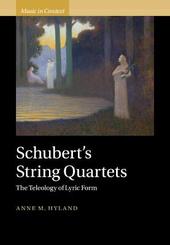
|
Schubert's String Quartets: The Teleology of Lyric Form
Hardback
Main Details
| Title |
Schubert's String Quartets: The Teleology of Lyric Form
|
| Authors and Contributors |
By (author) Anne Hyland
|
| Series | Music in Context |
|---|
| Physical Properties |
|
| Category/Genre | Classical music (c 1750 to c 1830)
Bands, groups and musicians |
|---|
| ISBN/Barcode |
9781009210928
|
| Classifications | Dewey:780.92 |
|---|
| Audience | |
|---|
| Illustrations |
Worked examples or Exercises
|
|
Publishing Details |
| Publisher |
Cambridge University Press
|
| Imprint |
Cambridge University Press
|
| NZ Release Date |
28 February 2023 |
| Publication Country |
United Kingdom
|
Description
Franz Schubert's music has long been celebrated for its lyrical melodies, 'heavenly length' and daring harmonic language. In this new study of Schubert's complete string quartets, Anne Hyland challenges the influential but under-explored claim that Schubert could not successfully incorporate the lyric style into his sonatas, and offers a novel perspective on lyric form that embraces historical musicology, philosophy and music theory and analysis. Her exploration of the quartets reveals Schubert's development of a lyrically conceived teleology, bringing musical form, expression and temporality together in the service of fresh intellectual engagement. Her formal analyses grant special focus to the quartets of 1810-16, isolating the questions they pose for existing music theory and employing these as a means of scrutinising the relationship between the concepts of lyricism, development, closure and teleology thereby opening up space for these works to challenge some of the discourses that have historically beset them.
Author Biography
Anne M. Hyland is Lecturer in Music Analysis at the University of Manchester and Associate Editor of Music Analysis. Her work on Schubert has appeared in leading journals and edited volumes on the composer. Her first published article won the Music Analysis 25th Anniversary Prize (2009).
Reviews'Considering the renewed interest in matters of musical form and the continuing fascination with this early Romantic composer, Hyland's book is a timely contribution that is eminently readable and elegant.' William E. Caplin, FRSC, Distinguished James McGill Professor Emeritus of Music Theory, McGill University
|